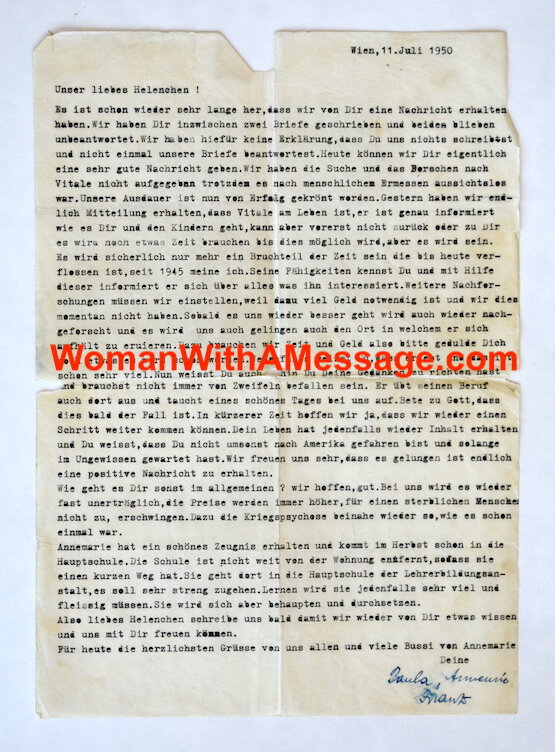Link to Family Tree to understand family relationships.
Today we have a letter from Harry in Quartermaster Training at Fort Francis E. Warren, Wyoming from Harry Lowell to his sister Eva in San Francisco.
July 19, 1943
Dear Sister,
Thank you for your kind letter which I am answering promptly.
Well, I might get a furlough in the very nearest future, and on the other hand I might not. So you see how things stand. The army has a way to keep you in suspension and to disappoint you, and vice versa. You never know what you are going to do the next hour.
What’s the latest dope on the nurses’ draft bill? I hope you can get into the Army Nurse Corps. Have you tried to appeal to that draft board yet? I think, that in spite of the fact that you can’t volunteer, there is a way to get in provided you use a little of your innate wisdom & spunk and also a bit of acting. You might mention the fact that you got your little brother in the armed forces and all that. It’s worth trying, Eva!
Say, I want to stand up in the defense of those lieutenants that seemed to be too good to dance on the same floor with the servicemen, as you stated. Army etiquette forbids commissioned officers to mingle with servicemen – you see it wasn’t the fault of the lieutenants entirely. Officers are not allowed into U.S.O.’s or other servicemen’s activities. This is part of many teachings that come under “discipline.” Even while the WAC’s were only WAAC’s, army officers were forbidden to date non-commissioned WAAC’s and vicey versey.
I spend my Sundays swimming at the lake and getting tanned, thus enjoying my stay here as much as possible. As you know, I have changed my opinion about Cheyenne and have pronounced it a pretty nice town. Ugh, I have spoken. Life is sweet and tender.
I got a letter from Bertha telling me about the arrival of Don and Jerry; I take it that they are keeping her quite occupied.
During the last week I saw a bit of beautiful scenery of Wyoming and Colorado. We drove the army trucks all over the country. I was driving and at the same time admiring ze wonders of nature. It’s a beautiful country, indeed. Come up and see it sometime, eh toots?
It seems that we are making a lot of progress in the various theaters of war. Maybe I’ll bask under the sun of Italy, looking at the waves of the Adriatic Sea, or enjoy the company of a petite mademoiselle de la France, or even have a few drinks in Heidelberg. What a vacation that would be, ah. (Daydreaming again, tsk, tsk.)
Anyway I’ll write you a card from any place I should happen to be.
Will you kindly excuse my writing today; it’s somewhat on the scribbling side on account of je ne sais pas.
Well, adios hermana mía; maybe I see you soon, yes, no?
Your brother,
Harry.P.S. Don’t forget what I told you about trying to get into the Nurse Corps. So long, Lieutenant!
In just a few months, Harry has gotten the hang of being in the army – there are no certainties – when and whether he can get a furlough, where he might be stationed, etc. He has no control over his life — this must have fed right into the family sense of fatalism.
It is interesting that Eva apparently wasn’t able to volunteer for the Army Nurse Corps. I assume it’s because she wasn’t yet a citizen. Harry on the other hand was able to enlist and to expedite his citizenship. Eva didn’t become a citizen until early in 1945. Congress didn’t get very far in considering drafting women until early 1945 . By then, Eva was married and would have been ineligible.
This letter clarifies a missing link on the family tree – her grandchildren were named Don and Jerry.
Harry writes that “Life is sweet and tender” which is echoed on an undated photo I have of him in uniform. Perhaps he sent the photo with this letter? Seeing it twice in his writing made me wonder whether it was a line from Goethe. A search on Goethe yielded nothing, but I found an operetta by Franz Lehar with a song entitled “Friends, life is well worth living!” by Paul Knepler and Fritz Löhner-Beda. According to Wikipedia, the operetta in 1934 in Vienna was performed for a few years premiered, but did not get much attention elsewhere.
Harry peppers his letter with French and Spanish, reminding us that he aspired to be multi-lingual like his father (see July 5 post)
Although Harry only writes of the present as an American soldier, I like to think that his quoting the memory of a song their mother would have sung with them and his throwing in bits of other languages is a reminder of their parents and their shared past.


































